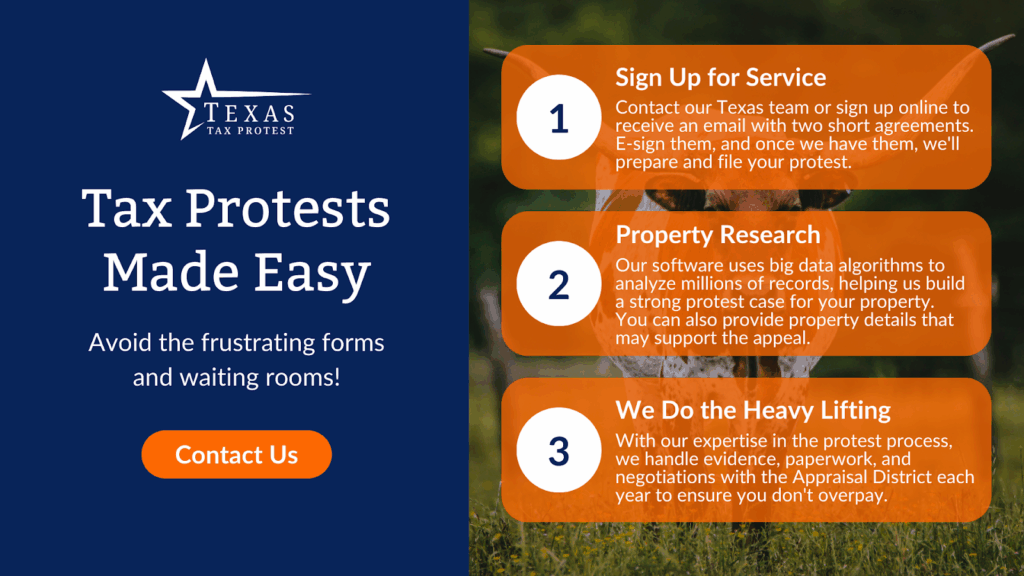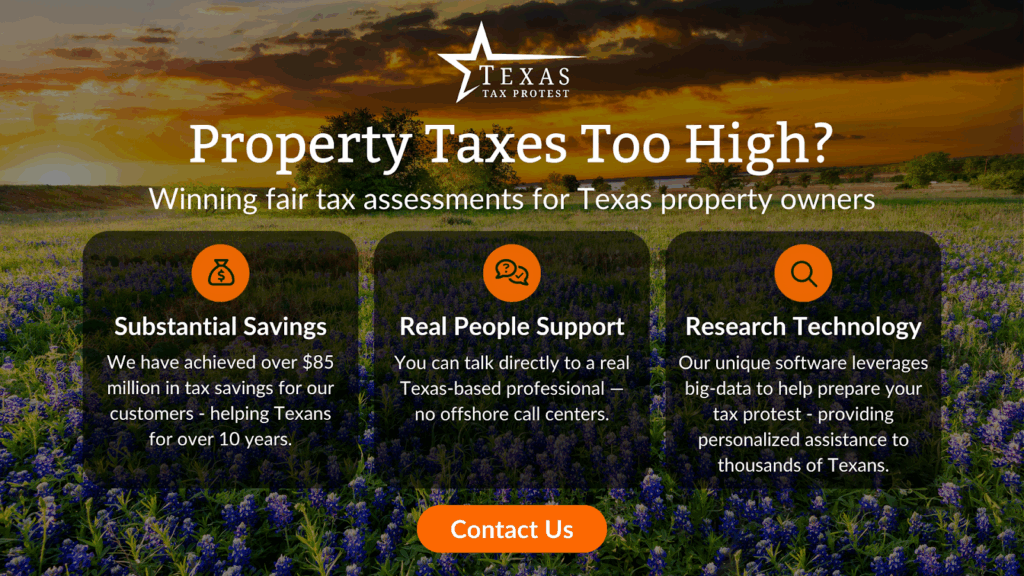What Do Property Taxes Pay For In Texas Communities?
September 13, 2025

Key Takeaways:
- Local-Only Impact: Property taxes in Texas fund local services, not state programs, making your community directly responsible for tax spending.
- Broader Funding Scope: Beyond schools and roads, taxes may fund things like public health clinics, animal control, and even mental health programs.
- Homeowner Empowerment: Understanding how taxes are used can help you challenge inflated property values with more confidence and strategy.
At Texas Tax Protest, we’ve helped Texas homeowners save over $85 million in property taxes by combining local expertise, advanced data analysis, and direct, Texas-based support. For over a decade, we’ve fought on behalf of property owners who are tired of being overcharged, and we do it with a white-glove, no-nonsense approach that gets results.
As a homeowner in Texas, you’re probably familiar with rising property tax bills, but less familiar with where those tax dollars actually go. While the amount you owe can feel arbitrary, the truth is that every line on your bill is connected to a local service, system, or public institution. Understanding how your tax dollars are used isn’t just educational, it’s a smart move that can help you assess whether your valuation is truly fair.
In this piece, we’ll break down exactly what property taxes pay for in Texas communities, so you know where your money goes, and what to do if it doesn’t add up.
How Property Tax Revenue Is Used In Texas Communities
When homeowners ask, “What do property taxes pay for?” the answer depends on where they live, but the core functions are similar across Texas. Property taxes fund the backbone of daily life in your community. This includes public safety, education, infrastructure, and essential local services that would otherwise be unfunded.
Here’s a breakdown of how these funds are typically allocated:
- Public School Districts – The largest portion often goes to funding K-12 education, teacher salaries, and school facility maintenance.
- City Services – This includes libraries, sanitation, parks, and recreation programs that improve your quality of life.
- County Governments – Courts, elections, and public health services are funded at the county level.
- Emergency Services – Fire departments, EMS, and local police rely heavily on property tax funding to operate effectively.
- Infrastructure – Roads, bridges, drainage systems, and public utilities are maintained with the help of property tax dollars.
These allocations vary slightly depending on your taxing authorities, but in most cases, you’re funding the services you interact with daily, whether you realize it or not.
Want help making sense of your property tax bill?
Connect with our Texas-based team, we’re real people, right here in Texas.

The Role Of Property Taxes In Texas Public Schools
In Texas, public schools are the single largest beneficiary of property tax revenue. In fact, a significant percentage of your annual property tax bill likely goes straight to your local Independent School District (ISD). This is because the state of Texas has shifted much of the burden of public education funding onto local communities, via property taxes.
Here’s how those dollars are used in schools:
Teacher Salaries and Benefits
Competitive pay for educators comes directly from local property taxes. These funds are essential for attracting and retaining qualified teachers, counselors, and school administrators.
Classroom Resources
Textbooks, technology, and other learning materials are purchased using district funds. From science lab equipment to student laptops, these resources are often directly funded by your local tax dollars.
School Facility Maintenance
Property taxes help maintain school buildings, HVAC systems, roofs, and other infrastructure needs. A portion of your payment goes toward ensuring safe, functional, and up-to-code learning environments for students.
Transportation Services
Buses and fuel costs for getting students safely to and from school are also locally funded. This includes vehicle maintenance, driver salaries, and the expansion of bus routes in growing neighborhoods.
It’s important to note that while the state contributes some funding, local property taxes remain the primary driver of school budgets. That means fluctuations in appraised property values can directly impact the quality of local education, from staffing to student resources.
While we all want to support quality education, we believe homeowners shouldn’t pay more than their fair share.
Let Texas Tax Protest help you challenge your valuation
Funding Infrastructure And Emergency Services
Beyond schools, property taxes play a vital role in keeping your community safe and connected. Two of the most essential areas funded by these taxes are infrastructure and emergency services, services that directly impact your daily life and wellbeing.
Infrastructure: The Roads You Drive On
Texas communities use property tax revenue to maintain and improve public infrastructure, including:
- Streets and roads
- Sidewalks and bike paths
- Bridges and overpasses
- Drainage systems and flood control
Without this funding, communities would face serious challenges in traffic management, water runoff, and long-term road safety.
Emergency Services: Help When You Need It Most
Property taxes also support:
- Fire departments (including volunteer stations in rural areas)
- Police departments and law enforcement operations
- Emergency Medical Services (EMS) and paramedic teams
These services rely on property tax revenue for staffing, training, vehicles, equipment, and facilities. Without consistent funding, emergency response times and public safety would suffer.
Texans should feel confident their tax dollars are going toward services that matter. That doesn’t mean you should accept an inflated valuation without question.
See how we can help you protest your property taxes
How Property Taxes Support Local Government Operations
When most Texans think about their property taxes, they often associate them with schools or roads. But a significant portion also goes to keeping local governments running efficiently behind the scenes.
Property taxes fund a range of civic operations that include:
County Clerk Offices
These offices are responsible for maintaining essential public records, including property deeds, marriage licenses, and court filings. Your tax dollars help ensure these records are kept accurate, accessible, and secure for legal and civic use.
Courts And Justice Systems
From traffic tickets to criminal trials, property taxes help fund the infrastructure of justice in your community. This includes judge and staff salaries, courthouse maintenance, and security personnel to keep operations running smoothly.
Elections And Voter Services
Local elections, ballot processing, voter registration drives, and polling locations all rely on funding from property taxes. These services are vital for preserving democratic participation and fair representation at the local level.
Public Health Services
In many Texas counties, property tax revenue supports local health departments, public clinics, and emergency response to public health threats. This funding allows communities to provide vaccinations, inspections, and preparedness programs for disease outbreaks or natural disasters.
City Administration
City management operations like budgeting, planning, public engagement, and economic development rely on stable tax funding. Property taxes help support the behind-the-scenes staff and systems that guide growth and daily operations in your neighborhood.
Every function may not be visible every day, but it all adds up to a smoothly functioning community. Your tax dollars help keep local government accountable, operational, and responsive.
That said, no homeowner should be stuck footing more than their fair share of the bill, especially due to inaccurate or inflated valuations.
Take the first step toward a smarter protest strategy
Why Knowing Where Your Taxes Go Matters
Understanding what property taxes pay for isn’t just about civic awareness , it’s about empowerment. The more you know about how your tax dollars are used, the better equipped you are to question your appraisal, challenge inaccuracies, and advocate for fairness in the process.
Here’s why this knowledge matters:
It Helps You Spot Overvaluations
When you understand how taxing authorities operate, you’re more likely to recognize when your property’s assessed value doesn’t match reality. That’s the first step in a successful protest.
It Puts The Power Back In Your Hands
Property taxes aren’t optional, but overpaying is avoidable. By knowing where the money goes, you can make more informed decisions about whether a protest is justified , and how to approach it strategically.
It Protects Your Investment
For most Texans, a home is their largest investment. Keeping your tax burden in check isn’t just about saving money , it’s about protecting long-term financial health.
At Texas Tax Protest, we’re passionate about helping homeowners take control of the process. With over $85 million in tax savings secured, we’re proud to support thousands of Texans every year.

Tired Of High Property Taxes? Here’s How Texas Tax Protest Can Help
If you’re like many Texas homeowners, your property tax bill keeps climbing, year after year. While local services need funding, you shouldn’t be left covering more than your fair share. That’s where the Texas Tax Protest comes in.
We’ve helped thousands of Texans save over $85 million through data-backed, professionally managed protests. Here’s how we do it:
We Use Big Data To Build A Smarter Case
Our proprietary technology analyzes real-time market data and comparable properties. We don’t just tell you to “find comps”, we apply mathematical adjustments to compare properties fairly, considering differences like square footage, lot size, age, and upgrades.
You’re Backed By Real People
Our team is Texas-based and accessible. No offshore call centers, no frustrating bots, just experienced professionals who understand the local tax landscape and speak your language.
We Offer White-Glove Support
From filing deadlines to evidence preparation, we handle the details so you can focus on what matters. Whether you’re in Tarrant County (TAD) or anywhere else in Texas, we’ve got your back.
You’re not alone in this, and you don’t have to navigate the process on your own.
Ready to take the next step? Let’s talk
Learn more about our services

Final Thoughts
Property taxes are a critical part of how Texas communities function—but that doesn’t mean every homeowner should blindly accept their bill. By understanding what property taxes pay for and how those dollars are used, you’re in a better position to evaluate whether your property has been fairly assessed.
At Texas Tax Protest, we believe knowledge is power—and action is even better. Whether it’s supporting public schools, funding emergency services, or maintaining your roads, your taxes should reflect accurate values, not inflated estimates.
If you think you’re paying too much, we’re here to help you take a smarter, data-driven approach to protesting your taxes.
Start your protest with professionals who know Texas
Read also:
- Understanding Property Tax Caps and Limitations in Texas
- What to Do If Your Texas Property Tax Protest Is Denied
- What Happens If You Don’t Pay Property Taxes in Texas
Frequently Asked Questions About Houston Housing Market
What are some unexpected things funded by property taxes in Texas?
Beyond schools and roads, property taxes can fund animal control services, public pools, mosquito control programs, local arts initiatives, and mental health programs—depending on your jurisdiction.
Do property taxes fund state-level operations in Texas?
No. Property taxes in Texas fund local government services only. State-level functions like state parks or highways are funded through other sources, like sales taxes and federal funding.
Can homeowners see a detailed breakdown of where their property taxes go?
Yes. Each year, local appraisal districts or tax assessor offices provide a breakdown of which taxing entities are collecting funds and at what rate. These are often available online through your county’s tax portal.
Do renters contribute to property taxes in Texas?
Indirectly, yes. While renters don’t pay property taxes directly, landlords typically factor the cost into rent, meaning tenants help cover those costs through their monthly payments.
Are religious institutions and non-profits exempt from paying property taxes?
Generally, yes. Qualified religious organizations and non-profits are typically exempt under Texas law, though the exemption must be formally approved by the appraisal district.
Can property taxes increase even if my home value doesn’t change?
Yes. Even if your appraised value stays flat, taxing entities can vote to increase the tax rate, which may result in a higher overall tax bill.
Do commercial properties pay different rates than residential properties in Texas?
Not different rates, but they’re often subject to different valuation methods. Commercial properties are typically assessed based on income potential, while residential properties use market comparables.
What happens if a homeowner doesn’t pay their property taxes in Texas?
Unpaid property taxes can lead to penalties, interest, and eventually a tax lien on the property. If not resolved, the county can initiate a tax foreclosure process.
Can property taxes fund local economic development projects?
Yes. Some Texas communities use a portion of property taxes to support economic development zones, small business grants, or tax-increment financing (TIF) districts.
How can homeowners influence how property taxes are spent?
Homeowners can attend local budget hearings, vote in local elections (especially bond elections), and stay involved in city council or school board meetings where budget decisions are made.











